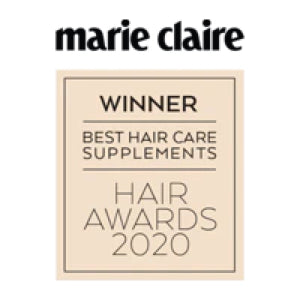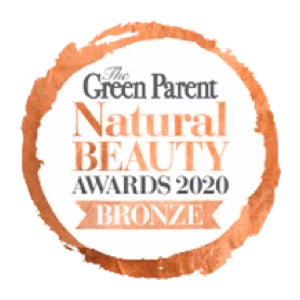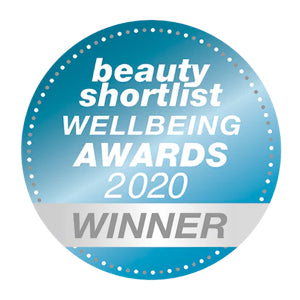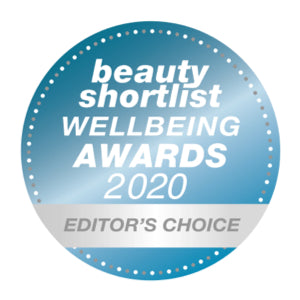There are many people continuing reporting signs and symptoms after recently recovering from COVID-19, symptoms such as respiratory issues to difficulty sleeping and fatigue can often be associated with Long COVID.
While we know the aftermath of contracting the virus can cause a huge range of issues in the body which can affect people differently, one common and often distressing symptom of COVID-19 being seen by dermatologists, hair loss specialists, nutritionists as well as reports in the press, is people - women especially - who have experienced hair loss.
In cases of illness and immune response such as when suffering from COVID, a person may find their hair begins to fall out, and/or stops growing, which can result in hair loss of up to 100% in more extreme cases. More and more people including celebrities like Alyssa Milano, Drake and clients of Simone, Paula Dale who has recently shared her journey have suffered hair loss after COVID.
A study in The Lancet published in January 2021 found 22% of their sample of COVID sufferers experienced hair loss, mainly women.
What Types of Hair Loss are Caused by COVID-19?
COVID-19 is known to provoke a strong immune response in the body, using up vital resources which are usually applied to other functions, including hair growth and hair health. As with a range of other medical conditions, the immune response means the body has to prioritise fighting the virus and protecting vital systems within the body over less vital functions, and a person’s hair can be one of the first things to suffer.
Scientists at the International Association of Trichologists have identified two types of excessive hair loss which appear to be directly related to contracting the virus, those being diffuse hair loss and alopecia areata.
Telogen Effluvium (TE) or Diffuse Hair Loss from COVID-19
Diffuse hair loss, also known as Telogen Effluvium occurs 2-4 months after the trigger event, in this case contracting the COVID-19 virus. TE can also occur in times of stress, grief, anxiety, other forms of illness, and treatments such as chemotherapy. COVID-19 has caused a huge amount of stress and anxiety around the world from loneliness, to grief, nutritional deficiencies, and financial and housing issues, increasing related hair loss issues even further. Read more about diagnosing Telogen Effluvium and how to treat TE hair loss.
Sufferers of TE have around three times as much hair fall as a person without it, shedding around 300 hairs over a day with a greater loss pattern on top of the head. Hair begins to appear thin as smaller numbers of hair follicles reach the anagen, or growth phase, and a larger number of hair follicles remain in the resting phase; otherwise known as the telogen phase. Normally up to 10% of a person’s hair is typically in the resting phase, but when suffering from diffuse hair loss this can increase drastically.
The good news is that there is a 95% chance of recovery from this type of hair loss when COVID-19 has subsided or been treated, and it can usually be rectified within six months.
Alopecia Areata (AA)
Hair loss from alopecia areata behaves differently to that of telogen effluvium. When COVID-19 causes this kind of hair loss, sufferers begin losing their hair in patches which appear in random patterns on the scalp. This gradually extends to other areas of the body and may affect eyebrows, eyelashes and hair over the body, a condition called Alopecia Universalis.
This is generally understood to be part of an autoimmune disorder, where the body attacks the hair follicles in a misguided attempt to protect itself. The exact causes are not known but AA is closely linked to extreme stress, and there is a strong correlation between COVID-19 patients and alopecia areata cases.
AA typically lasts for less than a year but may spontaneously reappear in the future. At present there is no defined way to tell which alopecia sufferers are likely to see a reoccurrence. Visit How to Treat Alopecia Naturally for more information.
Diagnosing Hair Loss from COVID-19
Diagnosis of hair loss due to COVID-19 is mainly carried out by a process of elimination of other potential causes. A doctor may carry out blood tests in order to rule out other common causes such as nutritional deficiencies, hormonal imbalances, the effects of childbirth, and hereditary hair loss. If you have recently suffered COVID-19 yourself and did not experience telogen effluvium or alopecia areata before this, you may find that it is the most likely cause.
If you suspect you are suffering from hair loss as a result of a COVID-19, visit our page to find more information on how to treat hair loss after covid. Alternatively, get in touch with the team who will be happy to help.
Long Term Effects of COVID-19 on Hair and Hair Loss
COVID-19 has not been around long enough for long term effects to be determined, it will take decades for a true picture to develop of the short- and long-term effects of the virus on our bodies, including the effect on our hair.
Any person who has contracted COVID-19 should look for improvements they can make to help ensure good health in the long run, and counter and future damage COVID-19 may cause.
6 Ways to Encourage Hair Regrowth After COVID
Hair loss due to COVID-19 is an outward sign of the overall health of the body. In times of crisis when the body is depleted, it takes time and work to rebuild a person’s inner health, and the condition of their hair. Great results take time, and how long hair regrowth takes varies from person to person. You can see the results from some of our clients on our hair regrowth case studies page. Check out Episode 11 with Paula Dale on the Simone Thomas Wellness Podcast as she shares her inspirational road to recovery after COVID.
Ways to help boost hair growth after COVID may include:
Regular Exercise
Regular exercise not only improves how we look and feel but helps the body perform at its best by increasing blood flow. This means an increased circulation of essential nutrients and oxygen throughout the body including the scalp, stimulating the hair follicles and encouraging regrowth after COVID-19.
Regular exercise has been shown to help promote healthy hair growth as well as improve physical and mental wellness. Even small amounts of gentle exercise after suffering COVID will help aid a faster recovery and assist in getting you back to your previous level of health.
Diet and Nutrition
A healthy head of hair starts with a healthy diet and balanced nutrition. If you have been a COVID patient you may find it hard to achieve a health balanced diet straight away. If you are struggling to get motivated to eat, try smaller, more frequent meals with snacks and plenty of hydration to get started with. Choose protein and energy rich foods where you can. Eating well encourages your body to combat the lasting effects of COVID and this includes hair regrowth.
Restricted diets may not give you enough proteins and other nutrients to grow strong healthy hair, and hair loss can be a side effect of very low-calorie or low-nutrient diet. Ensure your diet includes a balance of nutrient dense foods to give your body the vitamins and minerals it needs to work at its best, a key factor in hair loss and regrowth.
Scalp and Hair Consultation
To get your hair back to its previous health, consider booking a scalp and hair consultation with Simone Thomas Wellness. During a consultation your consultant will talk with you to identify key factors contributing to your hair loss. They will also take a sample of hair to check under a microscope, and use the results to help determine the cause, and build a custom hair growth plan designed around you.
Bioenergetics
Bioenergetics is a non-invasive way to get a full body MOT to discover what your body needs to get back on track when recovering from COVID-19. This modern method of screening your health identifies a range of potential issues such as deficiencies, sensitivities, hormonal imbalances and much more. Certain sensitivities and deficiencies can contribute to hair loss, so identifying them goes a long way to finding a custom hair loss solution for you.
Reduce stress
Stress is a major factor in the health or your hair and is often a contributor to short term hair loss and even breakage. Telogen Effluvium as described above is closely linked to stress, so it’s important to take positive steps to reduce stress to help preserve and improve the condition of your hair.
Supplementation
Combined with a healthy lifestyle, hair growth supplements can help give your body the additional nutrients it needs to nourish the hair follicles and encourage thicker, healthier and stronger hair. Key hair growth nutrients such as biotin and Ginkgo are combined in our award-winning hair care plans with other blends of vitamins, live cultures and botanicals to give your hair everything it needs to recover quickly and grow back strong and healthy.
Ginkgo Biloba B + for Covid Hair Loss
Simple changes can lead to big differences in your hair loss and regrowth journey. The addition of carefully formulated supplements to your diet can help promote healthy hair growth, leading to thicker, shinier, healthier locks.
Our Ginkgo Biloba B+ natural hair supplement has recently been voted No.1 Best Hair Care Supplements by The Independent, offering vegan-friendly hair plans containing Ginkgo Biloba and other high-quality ingredients that are designed to feed your hair with the best blend of high-grade vitamins, minerals and botanicals so you can feel confident that you are nourishing your hair and body from the inside out with the treatment it deserves in order to achieve thicker, shinier, and healthier hair.
With antioxidant properties, Ginkgo Biloba B+ works to nourish damaged hair follicles and cells in the scalp which may have been damaged following recovery from an illness such as covid, while also providing protection from various toxins that can further damage the hair. Ingredients such as Ginkgo Biloba helps to improve the body’s response to stress and anxiety, to encourage hair regrowth and strengthen the condition of our hair. Find out more information about how to diagnose covid hair loss and how you can combat hair loss after covid with supplements.
Discover Multi-award Winning Supplements
Browse our expertly formulated Ginkgo Biloba B+ supplements specifically designed to provide your body with the nutrients it needs to address covid hair loss. Save 20% off by subscribing to a monthly order of Ginkgo Biloba B+ , delivered straight to your door each month.
To boost your immunity along side encouraging hair regrowth, try our 3-Step-Plan with Ginkgo Biloba, Super Greens & Everyday Wellness to support your entire body. For more help or guidance on the health of your hair, contact the Simone Thomas Wellness team.
For more advice, download our FREE e-book ‘Guide to Addressing Hair Loss in a Healthy Way’ to understand more about hair loss from Hair Loss Consultant, Simone Thomas, as she shares her tips on how to combat hair loss in a natural, healthy way to encourage stronger, healthier hair & regrowth.
In this e-book you will find information on:
- The Hair Growth Cycle
- How our hair is impacted after illnesses
- Natural treatments and approaches to combat hair loss after illness
- The disadvantages to conventional hair loss treatments
- How to address hair loss in a healthy way, as recommended by Hair Loss Consultant, Simone Thomas.
Your Covid Hair Loss FAQs Answered
The COVID virus is able to trigger a wide range of symptoms from person to person. Increasingly, hair loss is being linked to the COVID virus and recognised as a COVID symptom either at the time of infection, or several months after the event. The Simone Thomas Salon reported a significant increase of new clients during the pandemic visiting after experiencing COVID related hair loss or other related complications from the virus. When the body undergoes extreme circumstances, it rallies to focus on essential operations to keep you alive and fight the infection. Non-critical physical elements, including the hair, can become a lesser priority and excessive shedding can occur as a result.
COVID tends to trigger one of two types of hair loss in sufferers, due to the negative impact it has on the skin, gut, and hair, resulting in excessive hair shedding and loss. The body fights hard to prevent the virus from developing further and destroying it, which can mean nutrients are diverted from non-essential functions to join the battle. The effect of the virus on hair varies from person to person, with some people noticing a general light thinning of the hair, and some suffering over 70%+ hair loss.
COVID related Telogen Effluvium (TV)
This type of COVID-related hair loss is identified by noticeable hair shedding and loss of volume and is triggered by illness such as COVID, stress and trauma and occurs some months after the illness or event.
COVID related Alopecia Areata (AA)
Alopecia caused by COVID tends to appear in the form of Female Pattern Hair Loss (FHPL) which is identified by the hair parting appearing wider and volume of hair diminishing significantly.
Typically, no. hair loss due to COVID is usually a temporary side effect caused by the stress the virus puts on the body. Once this threat has passed the body can begin to repair itself and, with the right support, regrow strong and healthy hair.
There are many ways to treat hair loss due to COVID, and there is no reason for hair not to improve over time with the right treatment. Treating COVID related hair loss begins with the Pillars of Wellness. To give your body the strength and tools it needs to repair itself after a bout of COVID you will need to focus on wellness and nourishing your body to help it combat COVID related issues.
These include paying attention to and working on:
- Nutrition
- Supplements
- Sleep
- Water
- Exercise
- Lifestyle
- Environment /Toxic Load
You will also need a healthy mind set and the patience to create and develop healthy habits while your hair recovers.
Incorporating high quality, targeted nutritional supplements help to create an ideal environment to boost strong healthy hair regrowth.
Ginkgo Hair Care Plan
Our Ginkgo Biloba plan is designed for anyone experience e hair loss due to stress, anxiety, trauma and illness including COVID.
The nutrients in the Ginkgo Hair Care Plan have been carefully created to support healthy hair regrowth as well as boosting gut health and the immune system, targeting key areas affected by COVID and helping you make a full and healthy recovery. Including Everyday Wellness for general health and Super Greens for a vitamin and mineral boost.
When combined with a healthy lifestyle the Ginkgo Hair Care Plan will help to:
- Support healthy hair & skin
- Reduces stress-related hair loss
- Maintains healthy circulation
- Improves brain function & energy levels
- Anti-ageing properties to target age related hair loss
- Reduces anxiety & depression
- Supports vision & eye health
- Improve gut health & digestion
- Support a healthy immune system
Simone Thomas Wellness offer specially formulated Ginkgo Biloba and Biotin supplements to support your scalp and encourage strong, healthy hair regrowth after COVID related hair loss.
Anyone looking to give their scalp and hair the best care and environment for regrowth after COVID related hair loss should consider incorporating our award winning supplements into their daily routine, along with regular gentle exercise and a nutrient rich diet.
The Simone Thomas Living Life Well podcast with Paula Dale gives an emotional insight into hair loss from COVID, and you can see her journey to recovery pictures in our case study for treating hair loss from within.






























